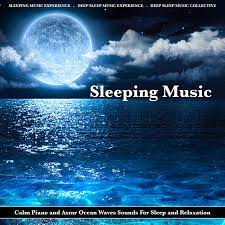Relaxing Sleep Music: Deep Sleeping Music for a Restful Night
In today’s fast-paced world, finding quality sleep can be a challenge. Our minds are often filled with thoughts, worries, and stress, making it difficult to unwind and achieve a restful night’s sleep. This is where relaxing sleep music comes in – an invaluable tool to help calm the mind, relax the body, and promote deep sleep.
Deep sleeping music is specifically designed to create a soothing environment conducive to relaxation and sleep. It utilizes various elements such as gentle melodies, soft instrumental sounds, and calming rhythms that work together to induce a state of tranquility. The harmonious blend of these elements helps slow down the heart rate, reduce muscle tension, and quiet the mind.
One of the key benefits of relaxing sleep music is its ability to alleviate stress and anxiety. As we listen to peaceful melodies and gentle tunes, our minds naturally shift away from the worries of the day. The melodic patterns and repetitive rhythms act as a form of meditation that promotes mindfulness and encourages us to let go of racing thoughts. This allows us to enter a state of deep relaxation where we can truly let go and embrace restorative sleep.
Moreover, deep sleeping music can also help regulate our breathing patterns. When we are stressed or anxious, our breathing tends to become shallow and rapid. However, by listening to calming music before bedtime, we can consciously focus on our breath and gradually slow it down. This deep breathing technique not only relaxes the body but also signals to our brain that it’s time for rest.
Another notable benefit of relaxing sleep music is its ability to drown out external noise disturbances. Whether it’s traffic sounds or noisy neighbors, these disruptions can significantly impact our ability to fall asleep or stay asleep throughout the night. By playing soothing music in the background, we create a buffer zone that masks these disturbances and allows us to drift off into a peaceful slumber.
It’s important to note that everyone has different preferences when it comes to sleep music. Some may find solace in classical compositions, while others may prefer nature sounds like rainfall or ocean waves. The key is to experiment and find the type of music that resonates with you personally and helps you relax.
In conclusion, relaxing sleep music, particularly deep sleeping music, is a powerful tool for achieving a restful night’s sleep. Its ability to calm the mind, relax the body, and create a serene environment sets the stage for deep relaxation and rejuvenation. So the next time you find yourself struggling to unwind before bed, consider incorporating some soothing sleep music into your routine. You may be pleasantly surprised by the positive impact it can have on your sleep quality and overall well-being.
7 Frequently Asked Questions About Relaxing Sleep Music for Deep Sleeping
- What type of relaxing sleep music is best for deep sleeping?
- How can I use relaxing sleep music to help me fall asleep faster?
- Is there a difference between relaxing sleep music and deep sleeping music?
- Can listening to relaxing sleep music improve my quality of sleep?
- What are the benefits of using relaxing sleep music before bedtime?
- Does listening to deep sleeping music make it easier to wake up in the morning?
- What kind of effects does listening to relaxing sleep music have on my body and mind?
What type of relaxing sleep music is best for deep sleeping?
When it comes to choosing the best type of relaxing sleep music for deep sleeping, it ultimately depends on personal preference. However, there are a few genres and elements that tend to be particularly effective in promoting relaxation and inducing a deep sleep state. Here are some popular options:
- Ambient Music: Ambient music is known for its atmospheric and ethereal qualities. It often features long, sustained tones, gentle textures, and minimalistic melodies. Ambient music creates a soothing and calming atmosphere that can help quiet the mind and prepare the body for sleep.
- Classical Music: Classical compositions, such as those by composers like Mozart or Bach, have been found to have a relaxing effect on the body and mind. The harmonious arrangements and melodic structures of classical music can induce a sense of tranquility, making it an excellent choice for deep sleeping.
- Nature Sounds: Many people find solace in nature sounds like rainfall, ocean waves, or forest ambiance. These sounds mimic the natural environment and can create a peaceful setting that promotes relaxation and deep sleep. Nature sounds are often combined with gentle instrumental music to enhance their soothing effects.
- Instrumental Music: Instrumental music without lyrics or vocals can be particularly beneficial for deep sleeping as it reduces distractions and allows the mind to unwind fully. Soft piano melodies, gentle guitar strumming, or instrumental compositions specifically created for relaxation can all contribute to a peaceful sleep environment.
- Binaural Beats: Binaural beats are an auditory illusion created by playing two slightly different frequencies in each ear simultaneously. These beats have been associated with promoting relaxation and altering brainwave patterns conducive to deep sleep. Binaural beats are often combined with ambient or instrumental music for a more immersive experience.
Remember that individual preferences may vary, so it’s essential to experiment with different types of relaxing sleep music to find what works best for you personally. The goal is to choose music that helps you unwind, calms your mind, and creates a peaceful atmosphere that promotes deep sleep.
How can I use relaxing sleep music to help me fall asleep faster?
Using relaxing sleep music to help you fall asleep faster can be a simple and effective technique. Here are some tips on how to incorporate it into your bedtime routine:
- Create a soothing environment: Set the stage for relaxation by creating a calm and peaceful sleep environment. Dim the lights, remove any distractions, and ensure your bedroom is comfortable and conducive to sleep.
- Choose the right music: Select sleep music that resonates with you personally. Experiment with different genres, such as classical, ambient, instrumental, or nature sounds, to find what helps you relax the most. There are also dedicated playlists and apps available that curate sleep-inducing tracks.
- Establish a consistent routine: Incorporate sleep music into your nightly routine to signal your body that it’s time for rest. Set aside a specific time each night to listen to calming music before bed, allowing yourself at least 30 minutes of uninterrupted listening.
- Practice deep breathing: While listening to the sleep music, focus on deep breathing techniques. Inhale slowly through your nose, allowing your abdomen to rise, and exhale gently through your mouth. This rhythmic breathing pattern helps relax both the mind and body.
- Use headphones or speakers: Depending on your preference, use headphones or speakers to listen to the sleep music. Headphones can provide an immersive experience by blocking out external noise distractions, while speakers can create a soothing ambiance throughout the room.
- Let go of thoughts: As you listen to the relaxing sleep music, try to let go of any racing thoughts or worries from the day. Allow the melodies and rhythms to guide your mind into a state of tranquility and focus on the present moment.
- Set a timer: If you’re concerned about leaving music playing all night long, set a timer on your device or use an app that gradually fades out the sound after a certain period of time. This ensures that you can peacefully transition into sleep without interruptions.
Remember, consistency is key when using sleep music to aid in falling asleep faster. By incorporating it into your nightly routine, you can train your mind and body to associate the soothing melodies with relaxation and sleep, ultimately helping you achieve a more restful night’s rest.
Is there a difference between relaxing sleep music and deep sleeping music?
While there is some overlap between the terms “relaxing sleep music” and “deep sleeping music,” they can be used interchangeably to refer to the same type of music. Both terms generally describe a genre of music that is specifically designed to promote relaxation, calm the mind, and facilitate a restful night’s sleep.
The primary goal of both relaxing sleep music and deep sleeping music is to create a soothing environment that helps induce a state of tranquility and prepare the body for sleep. They typically feature gentle melodies, soft instrumental sounds, and calming rhythms that work together to promote relaxation and alleviate stress.
The term “relaxing sleep music” emphasizes the overall relaxing nature of the music. It suggests that listening to this type of music before bedtime can help individuals unwind, let go of daily stressors, and create a peaceful atmosphere conducive to sleep. It focuses on creating a sense of calmness and tranquility.
On the other hand, “deep sleeping music” often refers specifically to music that aids in achieving deep stages of sleep. Deep sleep is an essential phase characterized by slow brain waves (delta waves) where our bodies undergo significant physical and mental restoration. Music labeled as deep sleeping music aims to facilitate this deep sleep state by promoting relaxation, reducing anxiety, and helping individuals reach those crucial stages of restorative rest.
In essence, while these terms may have slight differences in emphasis or connotation, they generally refer to the same genre of soothing music designed to support relaxation and enhance sleep quality. Ultimately, it’s important to find the type of music that resonates with you personally and helps you achieve a restful night’s sleep, regardless of how it may be labeled.
Can listening to relaxing sleep music improve my quality of sleep?
Yes, listening to relaxing sleep music can indeed improve the quality of your sleep. Here’s how:
- Reduces Stress and Anxiety: Relaxing sleep music has a calming effect on the mind and body, helping to alleviate stress and anxiety. By creating a peaceful atmosphere, it encourages relaxation and helps quiet racing thoughts that often hinder sleep.
- Promotes Mindfulness and Relaxation: The soothing melodies and gentle rhythms of sleep music act as a form of meditation, promoting mindfulness and deep relaxation. This allows you to let go of the day’s worries and enter a state of tranquility, making it easier to fall asleep.
- Slows Down Heart Rate and Breathing: Deep sleeping music can help slow down your heart rate and regulate your breathing patterns. By focusing on the rhythmic patterns of the music, you can consciously slow down your breath, which signals to your body that it’s time for rest.
- Masks External Noise Disturbances: Sleep music acts as a buffer against external noise disturbances such as traffic sounds or noisy neighbors. The soothing sounds help mask these disruptions, allowing you to drift off into a more peaceful sleep without being disturbed.
- Establishes a Bedtime Routine: Incorporating relaxing sleep music into your bedtime routine creates a consistent cue for your body that it’s time to wind down and prepare for sleep. Over time, this routine helps condition your mind and body for better sleep.
It’s important to note that while relaxing sleep music can be beneficial for most people, individual preferences may vary. Some individuals may find certain types of music more effective than others in promoting relaxation and improving their sleep quality. Experiment with different genres or styles of sleep music until you find what works best for you personally.
Remember, creating a conducive environment for quality sleep involves multiple factors such as maintaining a consistent bedtime routine, optimizing your sleeping environment (e.g., comfortable bedding, dim lighting), managing stress levels, and practicing good sleep hygiene. Incorporating relaxing sleep music into this holistic approach can be a valuable tool in improving your overall sleep quality.
What are the benefits of using relaxing sleep music before bedtime?
Using relaxing sleep music before bedtime offers several benefits for a restful night’s sleep. Here are some of the key advantages:
- Stress and Anxiety Reduction: Relaxing sleep music helps to calm the mind and alleviate stress and anxiety. The soothing melodies and gentle rhythms create a peaceful environment that promotes relaxation, allowing you to let go of the worries and thoughts that may keep you awake.
- Improved Sleep Quality: By creating a tranquil atmosphere, sleep music can enhance the quality of your sleep. It helps to slow down your heart rate, relax your muscles, and quiet your mind, leading to a deeper and more restorative sleep experience.
- Mindfulness and Meditation: Sleep music acts as a form of meditation, encouraging mindfulness by focusing your attention on the present moment. This practice helps to shift your focus away from racing thoughts or external distractions, allowing you to enter a state of deep relaxation conducive to falling asleep.
- Regulation of Breathing Patterns: Listening to calming music before bed can help regulate your breathing patterns. Deep breathing techniques promoted by the music help slow down your breath, signaling to your body that it’s time for rest and relaxation.
- Noise Masking: External noises such as traffic sounds or noisy neighbors can disrupt your sleep. Relaxing sleep music acts as a buffer by masking these disturbances with its soothing sounds, helping you maintain a peaceful environment for uninterrupted sleep.
- Establishing Bedtime Routine: Incorporating relaxing sleep music into your bedtime routine can establish a consistent ritual that signals to your body that it’s time to wind down and prepare for restful sleep. This routine can help condition your mind and body for better sleep patterns over time.
- Enhanced Mood and Well-being: Quality sleep is essential for maintaining overall mood and well-being. By promoting deep relaxation and improved sleep quality, relaxing sleep music contributes to better emotional balance, increased energy levels, improved concentration, and an overall sense of well-being.
Remember, the benefits of sleep music may vary from person to person. It’s important to explore different types of music and find what works best for you in creating a calm and soothing sleep environment.
Does listening to deep sleeping music make it easier to wake up in the morning?
While deep sleeping music can help promote a restful night’s sleep, its impact on waking up in the morning may vary from person to person. The primary purpose of deep sleeping music is to induce relaxation and facilitate a peaceful sleep, rather than specifically aiding in waking up.
That being said, some individuals may find that waking up to gentle and soothing music can create a more gradual transition from sleep to wakefulness. Soft melodies or nature sounds can serve as a gentle alarm, easing the abruptness of waking up to loud or jarring sounds. This can potentially contribute to a more peaceful and calm start to the day.
However, it’s important to note that everyone’s preferences and sensitivities differ. While some individuals may respond positively to waking up with music, others may find it ineffective or even disruptive. It ultimately depends on personal preference and what works best for each individual’s unique sleep-wake cycle.
If you’re interested in incorporating music into your morning routine, you can experiment with different types of gentle wake-up music or nature sounds that gradually increase in volume or intensity over time. Additionally, there are specialized alarm clock apps or devices available that simulate natural light or use gradual sound cues to ease the waking process.
Ultimately, finding an effective wake-up routine involves considering multiple factors such as sleep quality, personal preferences, and individual circadian rhythms. It may be helpful to experiment with different strategies and observe how they affect your overall well-being and readiness for the day ahead.
What kind of effects does listening to relaxing sleep music have on my body and mind?
Listening to relaxing sleep music can have several positive effects on both your body and mind. Here are some key benefits:
- Reduces stress and anxiety: Relaxing sleep music has a calming effect on the mind, helping to alleviate stress and anxiety. As you listen to soothing melodies, your brain releases endorphins, which are natural mood-boosting chemicals that promote relaxation and a sense of well-being.
- Lowers heart rate and blood pressure: The gentle rhythms and melodies in sleep music help slow down your heart rate, promoting a state of relaxation. This, in turn, can lower blood pressure and reduce the risk of cardiovascular issues associated with chronic stress.
- Enhances sleep quality: Deep sleeping music creates an environment conducive to sleep by promoting relaxation and reducing mental chatter. It helps you fall asleep faster, stay asleep longer, and experience deeper stages of sleep. This leads to improved sleep quality and waking up feeling more refreshed.
- Relaxes muscles and reduces tension: The calming sounds of sleep music can help relax your muscles by releasing tension accumulated throughout the day. As you unwind mentally, your body follows suit, allowing for a more restful night’s sleep.
- Improves focus and concentration: Listening to relaxing music before bed can improve focus and concentration during the day. By reducing stress levels and promoting better sleep quality, you’ll wake up feeling more alert, focused, and ready to tackle daily tasks.
- Promotes mindfulness: Sleep music acts as a form of meditation that encourages mindfulness. By focusing on the soothing sounds and melodies, you become more present in the moment while letting go of distracting thoughts or worries.
- Masks external noise disturbances: If you live in a noisy environment or have trouble ignoring external sounds while sleeping, relaxing sleep music can be particularly beneficial. It creates a background buffer that masks disruptive noises, allowing you to maintain a peaceful sleeping environment.
It’s important to note that the effects of sleep music can vary from person to person. What works for one individual may not have the same impact on another. It’s essential to find the type of relaxing sleep music that resonates with you personally and helps you achieve a state of deep relaxation and restful sleep.




